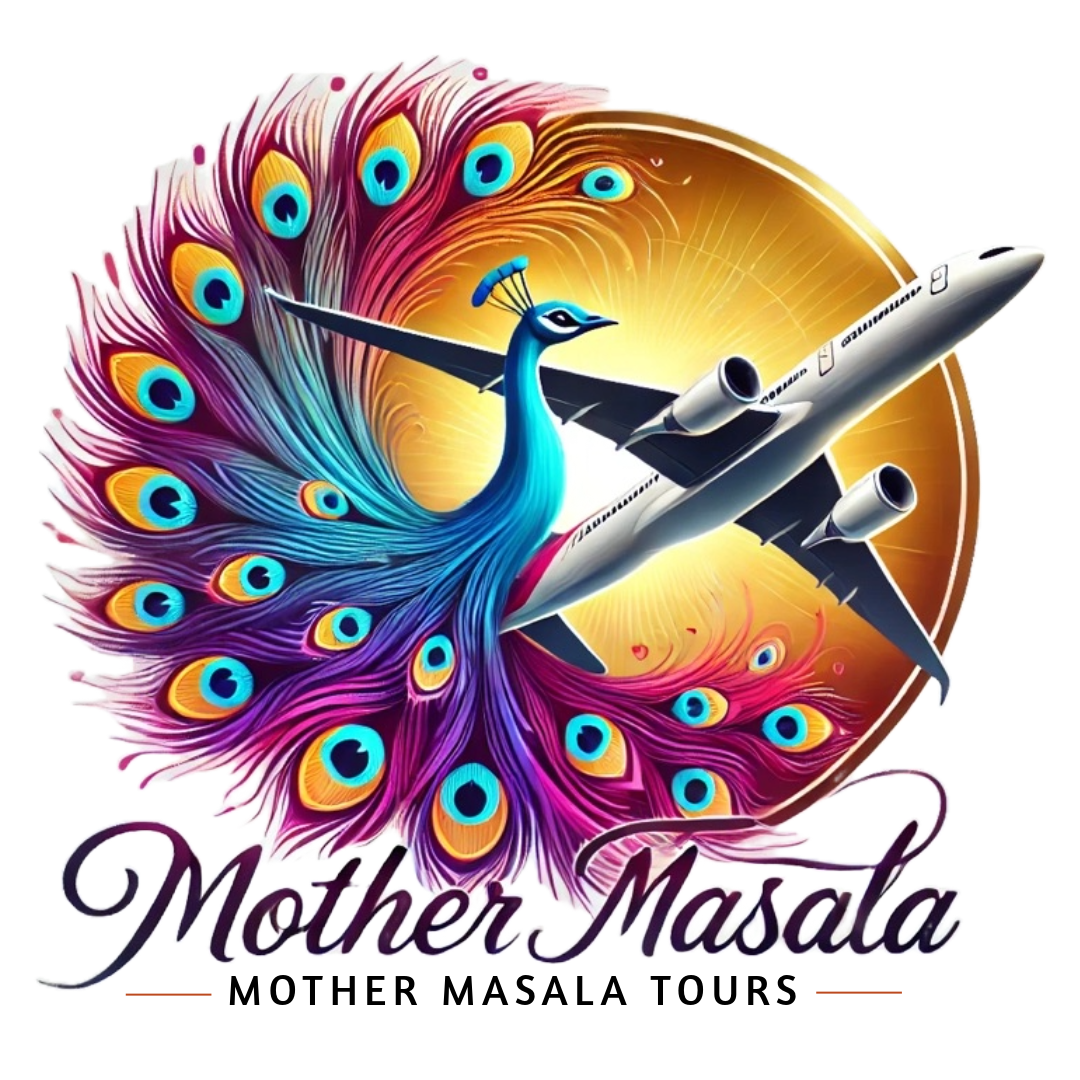
Empires and Ancient Encounters Tour India
Railway Journey Goa to Mumbai
Mother Masala Tours
The Konkan Coast
Railway Journey Goa to Mumbai. Is more than a ride - it’s a colorful slice of India’s cultural heartbeat. Weaves of green fields, roaring waterfalls, lively locals, and the irresistible aroma of chai define this iconic ride. Spanning 741 kilometers of Railway's engineering marvel, this passage takes us from Goa’s laid-back charm to Mumbai’s unmatched buzz. Along the route, we encounter mysteries of historical stations, flavors of regional cuisine and landscapes that seem plucked straight from a postcard. Come with us to uncover the magic of this route - where every whistle of the train and clatter of the tracks carries a new story waiting to unfold.
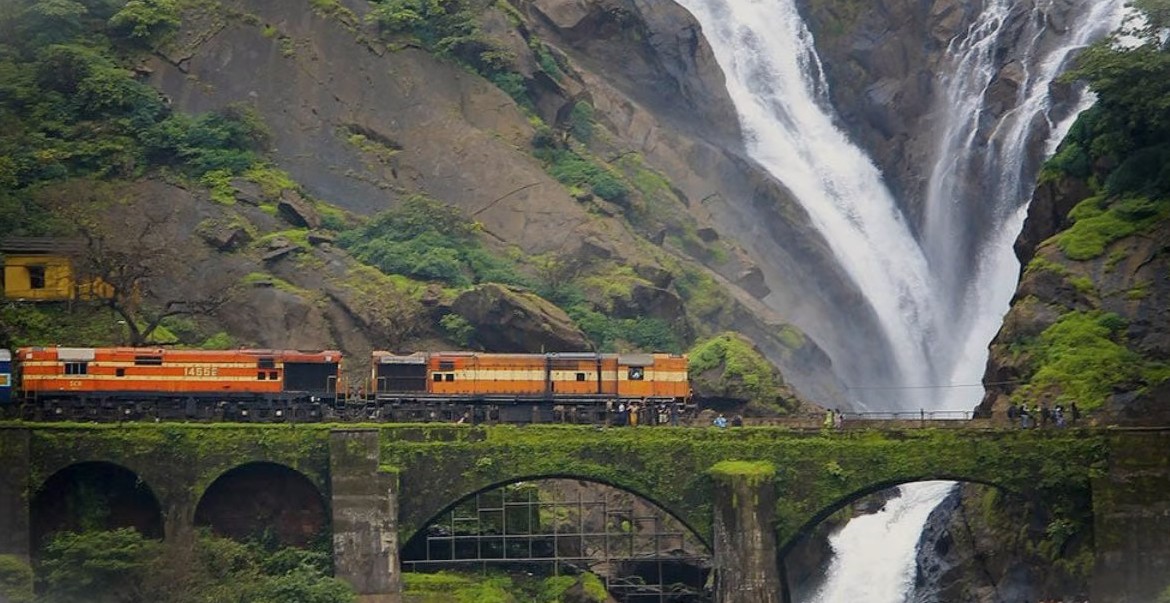
Railway Journey Goa to Mumbai: The Sights Beyond the Train Window
As the train departs Vasco da Gama station, the window feels like a moving painting. Coconut trees sway lazily in the wind while paddy fields glimmer under the tropical sun. Soon, the Western Ghats come into view, their slopes stretching high, blanketed in forests of green. The pièce de résistance, however, is the breathtaking Dudhsagar Falls, where foaming white waters tumble 310 meters down craggy rocks. Tunnels cut through the mountains, opening onto valleys filled with misty mornings and deep green vistas.
Meeting the Locals
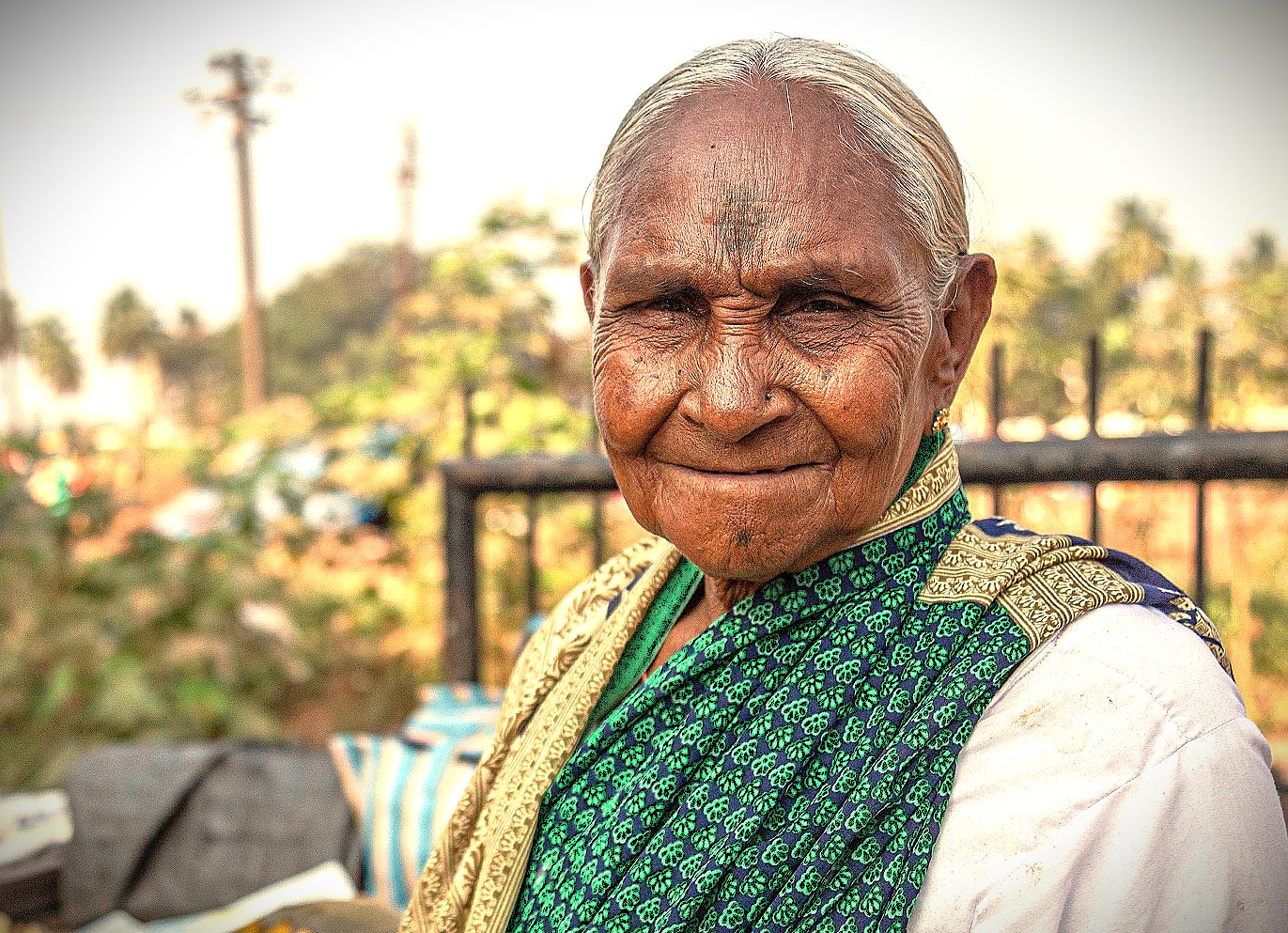
Railway Journey Goa to Mumbai. The train itself is alive with the chatter of passengers, each carrying their story. Farmers board at smaller stops, balancing baskets of fresh cashews or mangoes. Groups of children play simple games near the windows, their curiosity drawing them to the passing landscapes. Seasoned commuters, used to this route, trade smiles with strangers, breaking ice over plates of food or shared anecdotes. Street vendors hustle down the aisles, calling out for chai, coffee, or snacks - they serve as unofficial ambassadors of the train ride, connecting us to the flavors of the region.
The Food Onboard
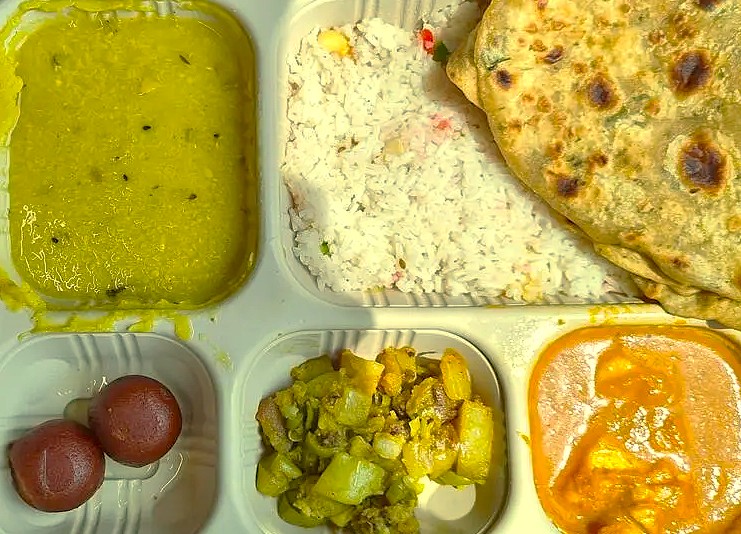
As the train chugs along, the smell of freshly brewed chai wafts through the carriages. Vendors carrying baskets of hot vada pav - a deep-fried potato-filled bun with spicy chutney - announce their arrival at every corner. Further along the route, you find fish curry thalis with steamed rice, spiced with Konkani masalas, or sweet banana fritters wrapped in piping-hot newspapers. Key station stops like Margao and Ratnagiri bring regional delicacies onboard, transforming the journey into a delightful culinary adventure. The rhythmic sway of the train complements the comforting flavors, creating an unforgettable experience.
Where the Train Takes Us
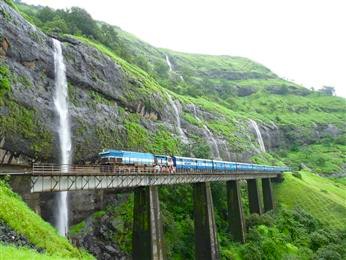
The stations along the Journey read like chapters in a captivating book. Vasco da Gama opens the journey, rich with tales of colonial history and Goa’s vibrant maritime trade. Margao, the cultural heart of Goa, beckons with bustling markets selling fresh seafood and an array of traditional sweets. The majestic Dudhsagar Falls then appears like a breathtaking centerpiece, offering once-in-a-lifetime views of cascading water as the train gracefully curves around its descent. Each stop on this scenic route unfolds a narrative, inviting travelers to discover the diverse heritage and beauty of India's western coast.
The Whistle and the Chai
The whistle marks the arrival of chai-walas, who hop aboard with kettles brimming with masala tea. Served in earthen clay cups in some areas or stainless-steel tumblers in others, every sip feels rooted in the land. These little chai moments punctuate the ride, bringing heat and comfort to the often cool mornings as the train curves through tunnels or pauses at breezy highland stations. It’s not just tea; it’s tradition poured into a cup.
The Ever-Changing Scenery
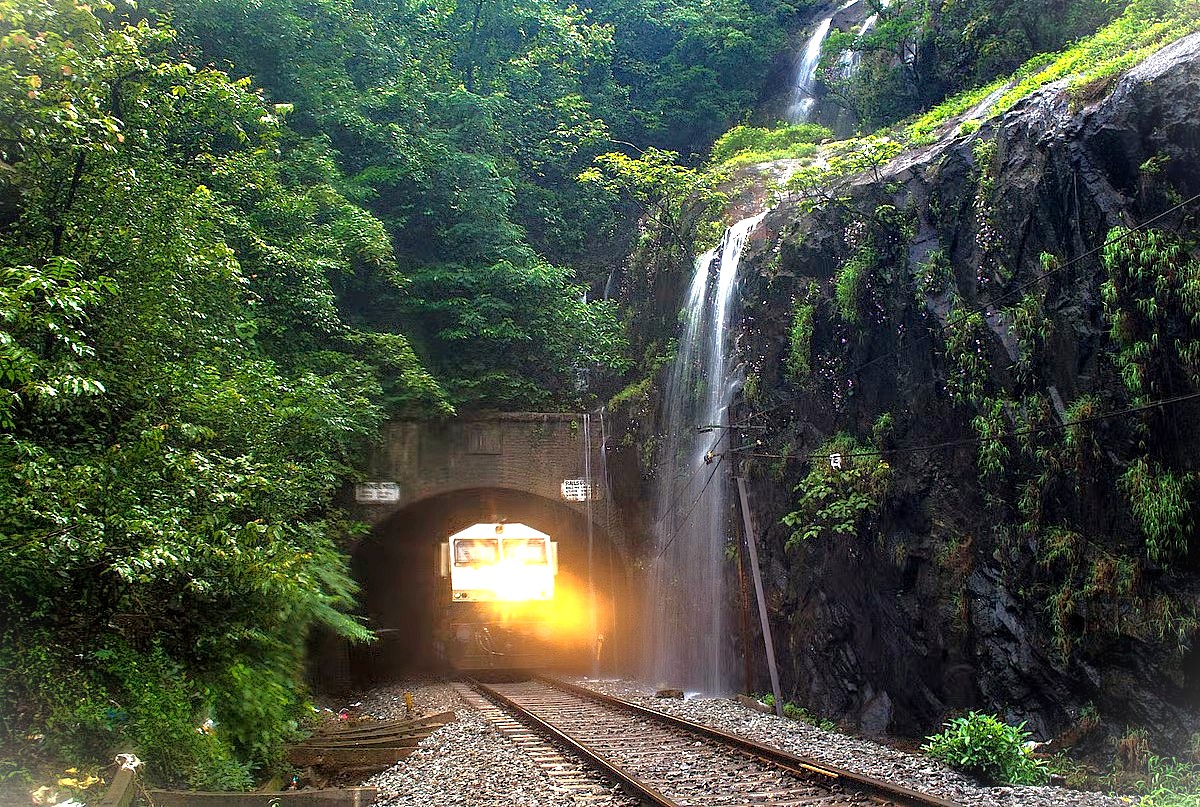
This is no ordinary commute; the route shifts like an artist’s palette, revealing a breathtaking transformation. We start with the salt-scented, laid-back beaches of Goa, where golden sands meet gentle waves, offering a serene beginning. The journey then delves into the dense jungle slopes of the majestic Western Ghats, a world of lush greenery and vibrant life. Mist hangs low over the valleys, making the entire scene look like something straight out of folklore, mysterious and enchanting. As the train winds closer to Mumbai, the scenery changes again, giving way to busy towns and industrial hustles as the megacity looms.
Conversations Across Carriages
Railway Journey Goa to Mumbai. There’s something special about how this train ride draws people together. From extended families traveling for weddings to young professionals heading into Mumbai to chase careers, social barriers seem to drop as soon as the journey begins. Strangers offer food to others, coaches erupt in laughter when kids play pranks, and long friendships are sometimes born in the shared ambiance of this moving community.
Gods Of The Tracks
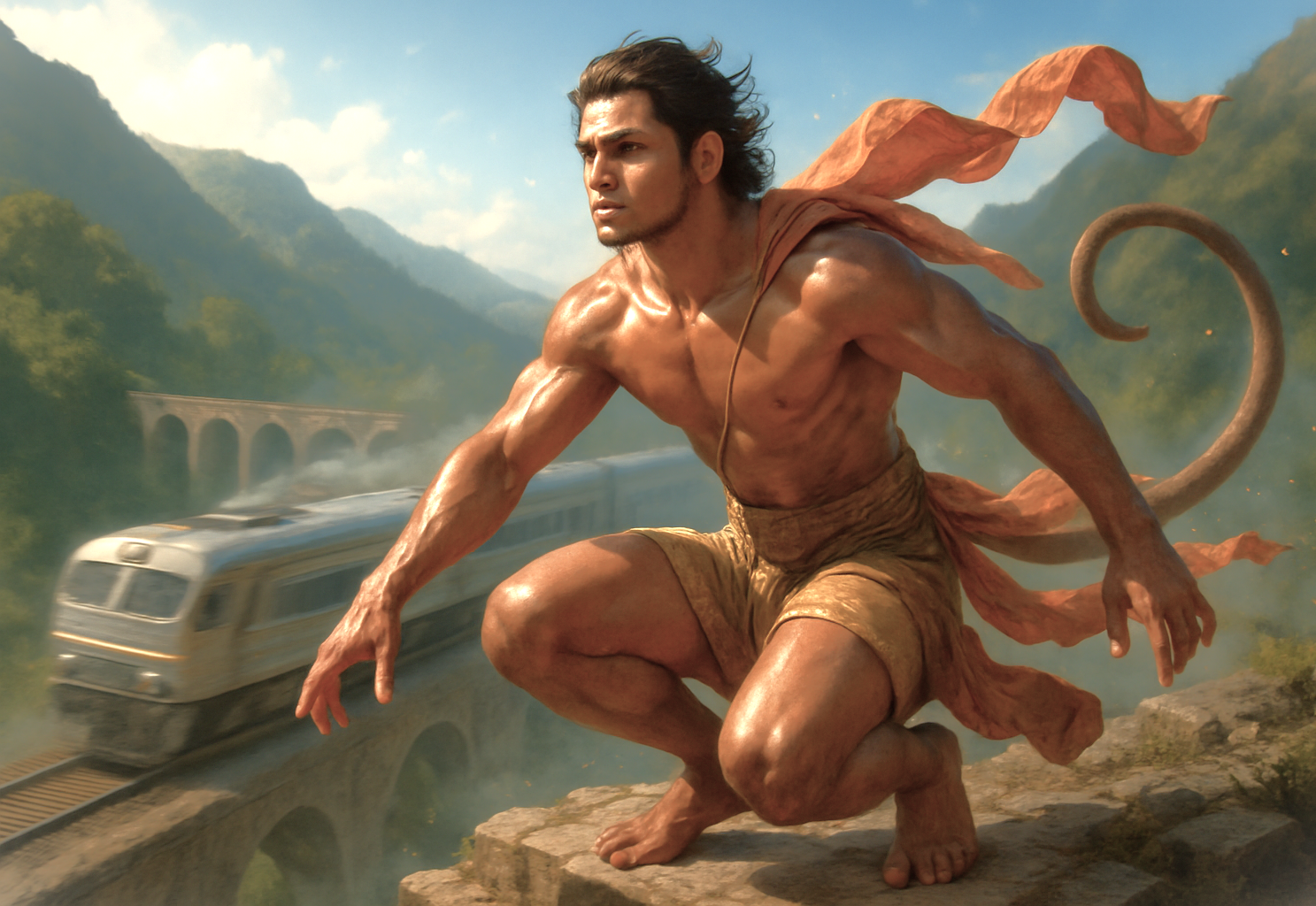
Hanuman is known for his strength and courage. People often ask for his blessing before long trips, counting on his watchfulness. He is seen as a companion who looks out for travelers. Some believe this ensures a safe passage and guards against accidents. Chanting his name or carrying a small image of him is thought to provide security on the road. The practice is simple and done without a lot of ceremony. This is a quiet tradition passed from one person to the next. The belief is that his presence helps clear the way ahead. People find a calm mind through this simple faith, and it becomes a steady part of any travel.
The Places We Leave Behind
The quaint stops we leave in our wake offer fleeting glimpses into village life on the Konkan coast. Little kids run barefoot along dirt roads; goats graze near the tracks; a shopkeeper waves from his shack that doubles as a tea stall. These are the moments that remind you that while the train moves forward, life here remains simple, steady, and timeless.
Arrival Into Mumbai
Railway Journey Goa to Mumbai. The final stretch glides past suburban sprawl, and Chhatrapati Shivaji Maharaj Terminus greets passengers with its towering edifice. Mumbai’s energy is palpable - a stark contrast to the serene villages and natural escapes behind us. Yet, the train fits into its chaos seamlessly, bringing stories, people, and flavors collected over 741 kilometers. This train journey invites you not just to move from one destination to another, but to connect with India’s landscapes, people, and soul.
Step Inside The Story - View All Tour Itineraries & Details
We’re here to offer genuine, thoughtful guidance for your travels. As a small, dedicated team, we pay close attention to every detail so you can focus on enjoying the experience while we take care of the planning. We believe the best trips begin when someone truly listens to what you want and how you like to travel, so the journey feels right for you and contributes to a happy, positive group on tour. Our communication stays clear, straightforward, and respectful at every step, with the goal of helping you feel understood, supported, and confident from first contact to the end of your journey. Click here:- Discover Life Travel - India Tour Specialists